Only good movies
Get the Indie Focus newsletter, Mark Olsen's weekly guide to the world of cinema.
You may occasionally receive promotional content from the Los Angeles Times.
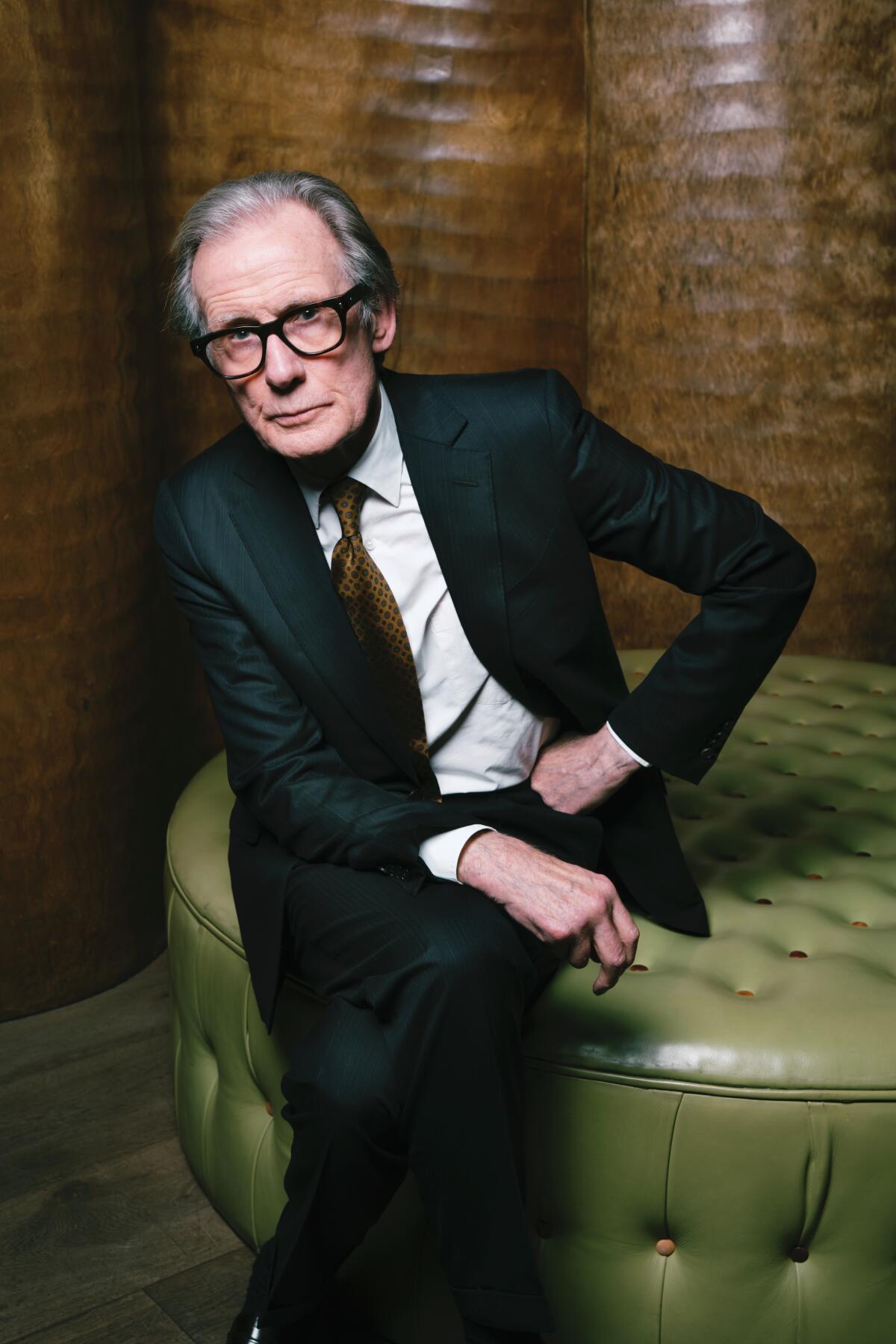
LONDON — Despite being an actor for more than five decades, Bill Nighy still has moments when he can’t believe his own life. The other day, for instance, Nighy went into a London coffee shop and the barista refused to accept his money. It’s happened to him occasionally, particularly with taxi drivers, but it always takes him by surprise.
“They said, ‘No, no, no, you’re not paying for that,’” Nighy recalls, sitting in the Ham Yard Hotel in London. “I walked away and I caught myself and I was thinking, ‘God, that would be great if that was happening to you.’ Like, that would be a nice thing if it was happening to someone else. And I realized I’ve always made that disconnect where I don’t really accept it as my personal experience.”
Now, more than ever, Nighy feels like he’s on the outside of his own experiences.
His acclaimed new movie, “Living,” has swept him into whirlwind of film festivals, global promotion and, possibly, a forthcoming Oscar nod for lead actor. He’s had a taste of this sort of attention before — Nighy won a BAFTA for “Love Actually” and earned a SAG nomination for “The Best Exotic Marigold Hotel.”
But “Living” is on another level.
“I thought at the time this was a significant movie, don’t get me wrong. I just didn’t think I was going to get phone calls from people saying, ‘I can’t get into the cinema,’” Nighy says.
“I’m not used to that. I mean, I make good films, but they’re not always the films people are drawn to.”
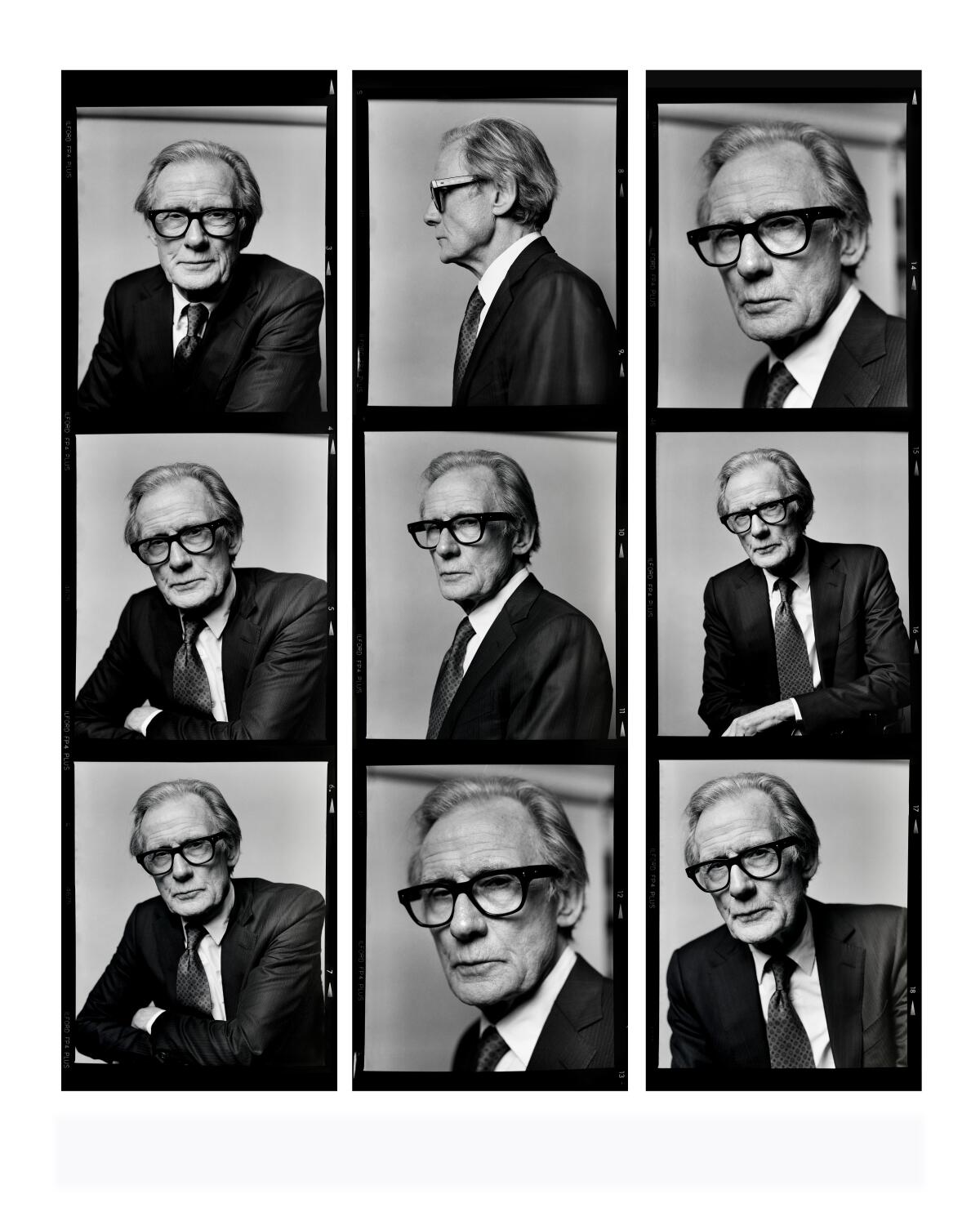
Exquisitely directed by Oliver Hermanus from a script by Kazuo Ishiguro, this English-language remake of Akira Kurosawa’s ‘Ikiru’ finds fresh depths in a classic.
Based on Akira Kurosawa’s 1952 film “Ikiru,” “Living” was written by novelist Kazuo Ishiguro and directed by Oliver Hermanus, and has undeniably gifted Nighy one of the best roles of his career. The actor, 73, plays a stoic English businessman named Mr. Williams, whose government job is to enable so much bureaucracy that nothing gets done. When Mr. Williams learns he is dying, uncomfortable self-reflection leads to newfound boldness.
For Nighy, who was cast before the onset of the COVID-19 pandemic, “Living” was compelling because of who was involved and, simply, because it was a great role. An English-language version of the story was suggested to Nighy by Ishiguro at a dinner party several years ago, and producer Stephen Woolley eventually persuaded Ishiguro to write it. Ishiguro and Hermanus workshopped the screenplay throughout the pandemic, and once it was complete, Nighy could sense it was special.
“I knew that if I didn’t mess it up, it would be something,” Nighy says. “But I didn’t imagine this. The response has been marvelous. People — rational people, people who are not drunk or high — have said great stuff. Really big stuff where you’re standing there going, ‘Really?’”
“Living” was filmed primarily in London in summer 2021, and it was the first thing Nighy shot after a year of pandemic closures. He had holed up in Suffolk, where he mostly watched TV or sat under trees and read (“I didn’t do anything useful”).
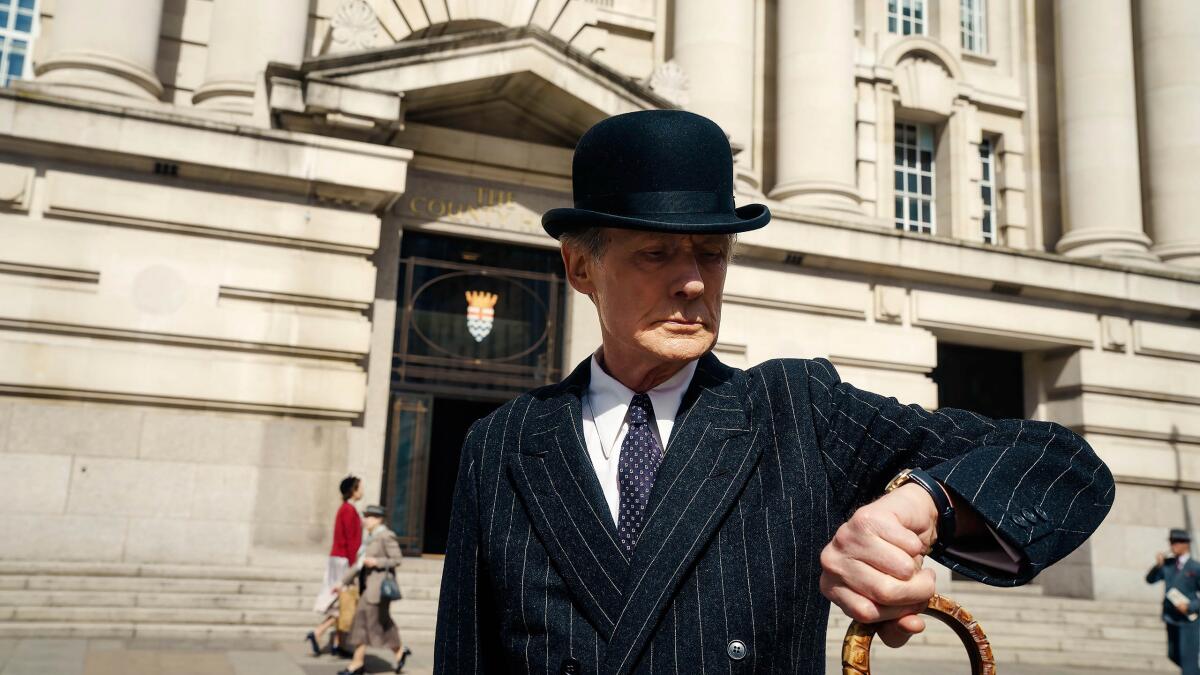
The actor was genuinely moved by the experience of being back on a film set, especially in his home base of London. He doesn’t feel, however, that he did anything particularly different on “Living.” It was his usual process: learn the lines backward and front, so he could be spontaneous on the day.
He brushes off questions about what he found compelling about the character because he says he doesn’t know how to answer them.
“I responded to the character, I suppose, because I do admire people who endure with dignity and don’t make a big song and dance about it,” Nighy shrugs. “There’s something about that I find heroic. We’re all heroic, you know. Mortality makes sure of that. I admire that kind of stoicism, although it can be unhealthy in extreme circumstances.”
Although Nighy claims he doesn’t need to feel empathy for his characters, or even to like them, his costars observed just how much he understood Mr. Williams. Aimee Lou Wood, who plays a coworker whom Mr. Williams befriends, was constantly amazed by Nighy’s work on set.
“He’s heartbreaking and so transformative in the film,” she says. “It sounds a bit cheesy, but I genuinely would forget that it was Bill. His performance in itself is just stunning and beautiful. It does shatter your heart into a million pieces. But also watching an actor who I’ve always loved, whose thing is that they’re so full of sparkle and cheekiness and charm, be so turned down and him become a much more timid, lost person in this role was so moving.”
Nighy, who rose through the ranks in regional theater around England in his 20s and at London’s National Theatre in his 30s, is certainly best remembered for his more boisterous roles. His performance as washed-up pop star Billy Mack in “Love Actually” is perhaps his most famous, but the actor has similarly stolen the screen in such movies as “Shaun of the Dead,” “Pirates of the Caribbean: Dead Man’s Chest,” “About Time” and Autumn de Wilde’s recent adaptation of “Emma.”
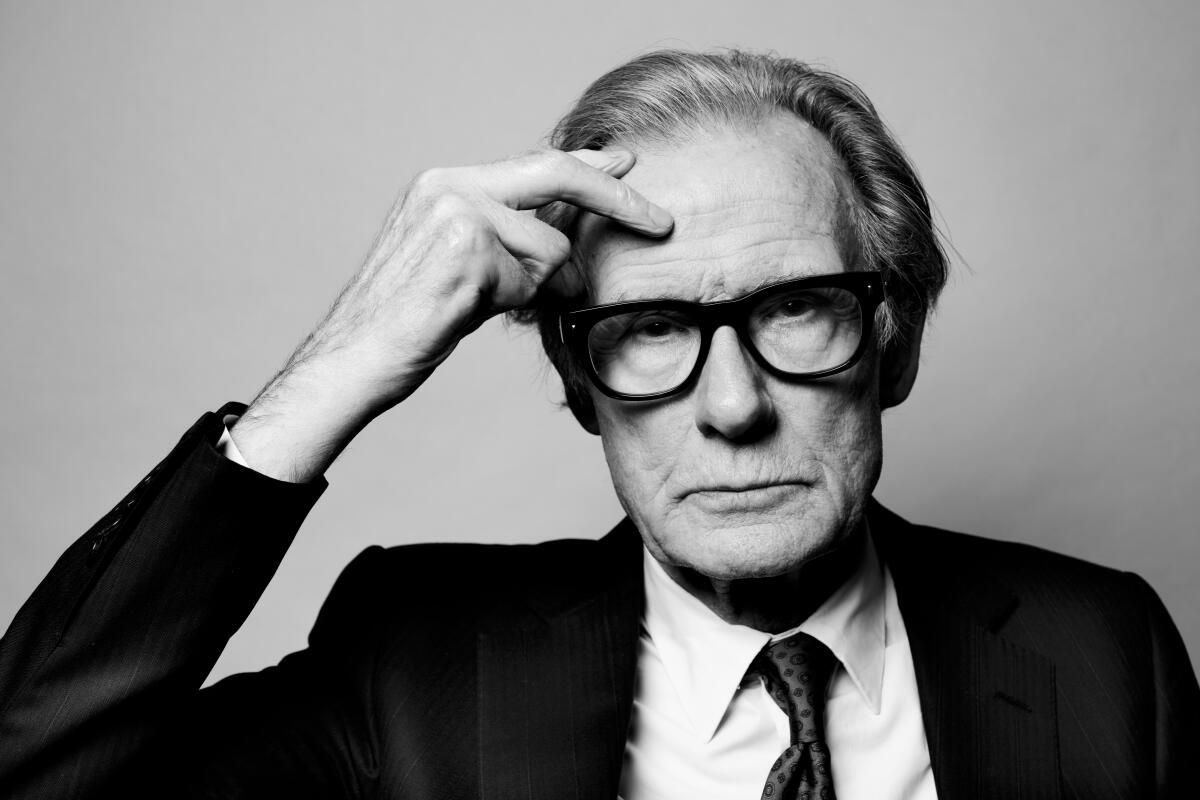
Writer Kazuo Ishiguro and director Oliver Hermanus want a younger generation to take the lessons of the film “and give them new energy.”
For someone who didn’t break into film until his 40s, Nighy has acquired a remarkably vast IMDb page. And each new success has, sincerely, been a complete surprise.
“I didn’t expect to be on television,” he says. “I certainly didn’t expect to be in a film.”
In the 1960s as he was coming up, film opportunities for actors from the U.K. were sparse, as Nighy explains it — unless you were a Sean Connery or a Michael Caine.
“There wasn’t a lot of traffic out of here,” he says. “As a young actor, I never expected to go to Los Angeles.”
His first big film role came in 1998’s “Still Crazy.” “I think it was because everyone else turned it down,” Nighy says. “I always assumed that my whole career was based on six other people turning it down before me.”
Nighy landed a few more movie roles after “Still Crazy,” primarily in British films. But 2003 changed everything. That year, Nighy starred in three projects: “Love Actually,” “Underworld” and “State of Play.”
Suddenly, he became more and more sought after, particularly for roles that required a bit of “fizz,” as Wood describes it.

Despite appearing in numerous projects since, Nighy knows that “Love Actually” will be in the headline of his obituary. People quote Billy Mack to him daily, including on the day of this interview while Nighy was at lunch. An American immigration officer even once intoned Billy’s famous line — “Don’t buy drugs. Become a pop star and they give you them for free!” — at 4 a.m. in the customs queue.
“A lot of people do that,” Nighy says with a grin. “Or they do air guitaring.”
Because Nighy regularly strolls the streets of London and takes the Tube, he truly is the expert on Bill Nighy fandom. (He refuses to get a car because he hates carrying things and having a car is “like carrying this really big thing, which you then have to put somewhere.”)
When fans approach him with anecdotes or questions, he happily indulges.
“Everyone in London has a story about seeing Bill,” confirms Wood, who encountered Nighy once while in drama school, years before they met. “Everyone that you ever speak to goes, ‘Oh, I saw Bill once in Piccadilly’ or ‘Oh, I saw Bill once in a bookshop.’ Every single person. It is actually like a weird phenomenon.”
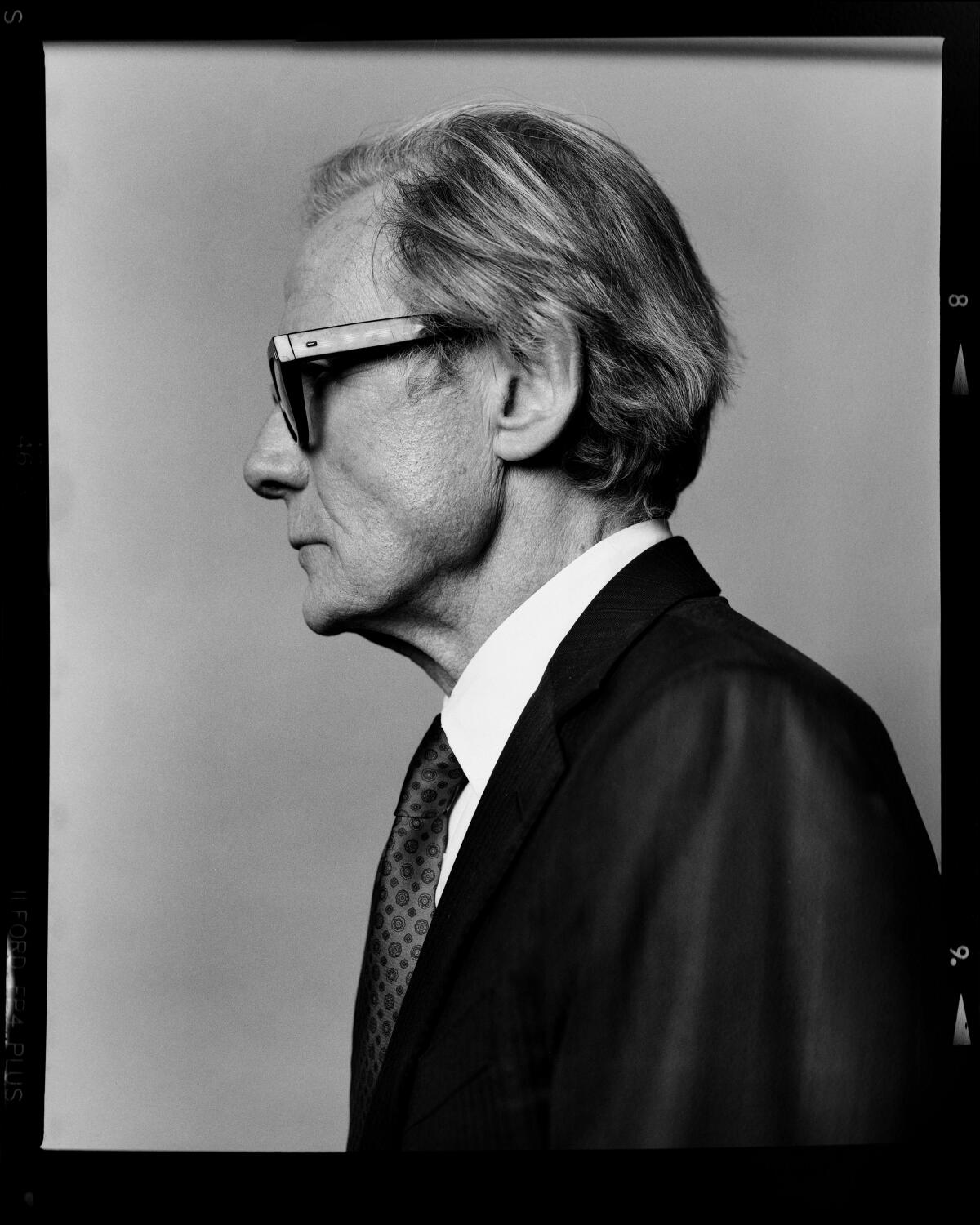
A Times guide to the Christmas classics, from ‘It’s a Wonderful Life’ to ‘Scrooged,’ and where to find them — with an introduction from Ron Howard.
The encounters act as a barometer for the current perception of his career. Sometimes people assume he’s taken a long break because they haven’t seen him in anything lately. Or they wonder when he’ll call it quits. Recently, a young woman directly asked Nighy, “Why don’t you stop?”
“Because of ‘Living,’ there’s a section of the community that thinks I’ve come back to work,” he laughs.
He clearly doesn’t mind the questions. “And I’ve heard about retirement, but I don’t like the sound of it. Why would you do that? And there’s no need. Fortunately, I’m in a job where I don’t have to retire as long as I can remain upright. And, actually, I could also play sitting-down roles.”
The obvious follow-up query is: So you still enjoy acting after all these years? But Nighy isn’t fond of the word “enjoy.” In fact, it seems to make him uncomfortable. “I should just say yes,” he acknowledges. “‘Yes’ and smile.”
But he doesn’t.
Nighy is drawn to acting because it’s challenging and anxiety-inducing and sometimes, although rarely, it is completely transformative, as it was while making “Living.”
“There are certain jobs where I really think I know what I’m doing, and there aren’t many of them,” Nighy says. “The others, I just have to get through it as best I can. A lot of people wouldn’t know the difference. But in terms of how I feel about it: Sometimes you think you really own it and sometimes you think you’re half on it. Or maybe you’re on it and you’re not sure. With ‘Living,’ I sort of did [feel like I was on it]. I did. Once we got going, I thought, ‘I’m going to be OK.’”
'Living'
Rated: PG-13, for some suggestive material and smoking
Running time: 1 hour, 42 minutes
Playing: Starts Dec. 23 at Laemmle Royal, West Los Angeles
Only good movies
Get the Indie Focus newsletter, Mark Olsen's weekly guide to the world of cinema.
You may occasionally receive promotional content from the Los Angeles Times.